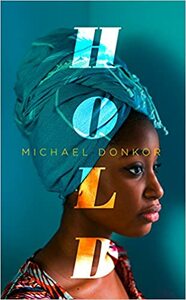Take a photo of a barcode or cover
I really wanted to like this and I loved the concept of two clashing worlds in the form of Belinda and Amma, especially as they both carried secret shames. Unfortunately aside from the odd moment of beautiful writing, the story itself was flat and dragging and I found the dialogue particularly irritating and hard to follow. I think Amma's story was the most interesting and yet it was barely explored.
slow-paced
Plot or Character Driven:
Character
Strong character development:
No
Loveable characters:
No
I was interested by the plot of this book, and reading the experiences of someone moving from Ghana to London.
While the characters were interesting, I don’t think the author went into enough detail about the cultural differences and how Belinda actually felt which meant the story was very slow and not much really happened. Although the story is split between Belinda and Amma, the girl she has come over to help, there are far more chapters on Belinda.
An interesting story, but doesn’t give enough of an insight into what it is like to move from one country to another very different one.
While the characters were interesting, I don’t think the author went into enough detail about the cultural differences and how Belinda actually felt which meant the story was very slow and not much really happened. Although the story is split between Belinda and Amma, the girl she has come over to help, there are far more chapters on Belinda.
An interesting story, but doesn’t give enough of an insight into what it is like to move from one country to another very different one.
This wasn’t a bad book at all. For most of it, particularly the parts in London, it was really engaging and felt like it was building towards something at a tremendous pace. I was really hooked at that point. However, then the pace dropped off and the big event at the end wasn’t quite what I’d hoped for, with lots left unresolved. Also, at times there was a lot of phrasing/description that felt unnecessary and forced which spoilt it a bit. That said, I still enjoyed it for the most part.
The book had some fabulous scenes that were poignant and touching. The characters were complex and dealing with new situations, emotions and events. They learn to cope, to push back or accept, and, above all, to survive.
A nicely written but thick book with a strong sense of place. Well, places. A town in Ghana, a village in Ghana, and London.
I found it a bit long at times, lots of observations and minimal action or tension. I hope his next book it tighter.
A nicely written but thick book with a strong sense of place. Well, places. A town in Ghana, a village in Ghana, and London.
I found it a bit long at times, lots of observations and minimal action or tension. I hope his next book it tighter.
“Maybe. But, like, really, aren’t we all made of flesh and skin underneath it all? Aren’t we made of much, much softer things that break too easily?”
The go-to belief of everyone, man, woman and child, irregardless of race, is that the black woman is strong. The black woman is invulnerable. The black woman is unbreakable. It is a disservice to women who hurt and bleed like everyone else but have been taught by society to swallow their hurts and pain and sometimes take joy in it, because the pain in some way, speaks to their indomitable spirit.
I and the writer, call bullshit. Black women hurt. Black women break. Black women bleed. And it’s the same, whether they’re in a place of certain comfort in the UK, or they’re safe in Accra or Daban, or in the villages on the outskirts of town, their pain is universal, a cry to be seen, to be understood, to be loved. And this is laid out so beautifully for us to see.
Depression is a strong theme within the book, as is the pretense that is carefully curated to hide the pain and the hollowness that a lot of the women in the book face. It’s something that sits heavy in the text, not letting up till the very end. This is a book that surrounds you with helplessness and drowns you in pain.
The writing is sometimes poignant, sometimes difficult to get into, with a pidgin that’s hard to follow, although when you figure out the rules, it makes it easier. The glossary of terms at the start of the book also helps to make things easier, but Michael Donkor doesn’t feed you with a word for word translation. He aims to tell a story, not teach you linguistics and language.
Another thing he does well? The portrayal of the female characters who are all well-rounded figures in their own right, with distinct voices and characteristics. A lot of male writers suck at describing women, they suck even more at telling their story from a woman’s perspective. Michael doesn’t have that problem. Belinda could easily be the store trader you know from your school days. Amma could easily be a classmate and Mary, the rascal of a younger sister with a temper and an unending list of questions. The story would definitely not be the same without them.
My problem with the story though is that it meanders. For so long, nothing happens and after the thrill of Belinda’s relocation to London is passed, we settle into a fairly dull monotony that is brightened only when Amma shows up to throw a wrench in the works and destabilized Belinda’s carefully made up world. Speaking of Belinda, hers is a depiction of an OCD that is done so tastefully and masterfully, that it’s an indelible part of her, connected to where she is coming from and who she will eventually become.
The story does eventually pick up in the later quarter of the book with an event that would certainly have you wishing you could go back to the book when nothing happened.
As such, it’s a solid 4/5 star read. It would have been higher, but like I said, it dragged for a while.
The go-to belief of everyone, man, woman and child, irregardless of race, is that the black woman is strong. The black woman is invulnerable. The black woman is unbreakable. It is a disservice to women who hurt and bleed like everyone else but have been taught by society to swallow their hurts and pain and sometimes take joy in it, because the pain in some way, speaks to their indomitable spirit.
I and the writer, call bullshit. Black women hurt. Black women break. Black women bleed. And it’s the same, whether they’re in a place of certain comfort in the UK, or they’re safe in Accra or Daban, or in the villages on the outskirts of town, their pain is universal, a cry to be seen, to be understood, to be loved. And this is laid out so beautifully for us to see.
Depression is a strong theme within the book, as is the pretense that is carefully curated to hide the pain and the hollowness that a lot of the women in the book face. It’s something that sits heavy in the text, not letting up till the very end. This is a book that surrounds you with helplessness and drowns you in pain.
The writing is sometimes poignant, sometimes difficult to get into, with a pidgin that’s hard to follow, although when you figure out the rules, it makes it easier. The glossary of terms at the start of the book also helps to make things easier, but Michael Donkor doesn’t feed you with a word for word translation. He aims to tell a story, not teach you linguistics and language.
Another thing he does well? The portrayal of the female characters who are all well-rounded figures in their own right, with distinct voices and characteristics. A lot of male writers suck at describing women, they suck even more at telling their story from a woman’s perspective. Michael doesn’t have that problem. Belinda could easily be the store trader you know from your school days. Amma could easily be a classmate and Mary, the rascal of a younger sister with a temper and an unending list of questions. The story would definitely not be the same without them.
My problem with the story though is that it meanders. For so long, nothing happens and after the thrill of Belinda’s relocation to London is passed, we settle into a fairly dull monotony that is brightened only when Amma shows up to throw a wrench in the works and destabilized Belinda’s carefully made up world. Speaking of Belinda, hers is a depiction of an OCD that is done so tastefully and masterfully, that it’s an indelible part of her, connected to where she is coming from and who she will eventually become.
The story does eventually pick up in the later quarter of the book with an event that would certainly have you wishing you could go back to the book when nothing happened.
As such, it’s a solid 4/5 star read. It would have been higher, but like I said, it dragged for a while.
3.5 stars: Housegirl is a tender coming-of-age story with passionate, vivid characters. I love reading about the sisterly relationship between Belinda and Mary and the slowly developing friendship between Belinda and Amma. Both Belinda and Amma have painful paths to claiming their own distinct identities, and Donkor writes both of them with great compassion. There was a plot element near the end that was pretty predictable, which is why I’m not quite giving this 4 stars but Michael Donkor is definitely a writer to watch.
I was sent this book as an ARC via NetGalley in exchange for an honest review.
I am choosing to not continue with this book as I am more than halfway through and I am not finding it enjoyable.
I am choosing to not continue with this book as I am more than halfway through and I am not finding it enjoyable.
challenging
emotional
informative
inspiring
medium-paced
Plot or Character Driven:
Character
Strong character development:
Yes
Loveable characters:
Complicated
Diverse cast of characters:
Yes
Flaws of characters a main focus:
Complicated
This book explores identity, cultural differences, and sometimes how they clash in ways you wouldn't think they would. It also explores life as a first-generation immigrant in the diaspora and how one navigates this. it was excellently written and something I could relate to a lot
challenging
emotional
medium-paced
Plot or Character Driven:
Character




